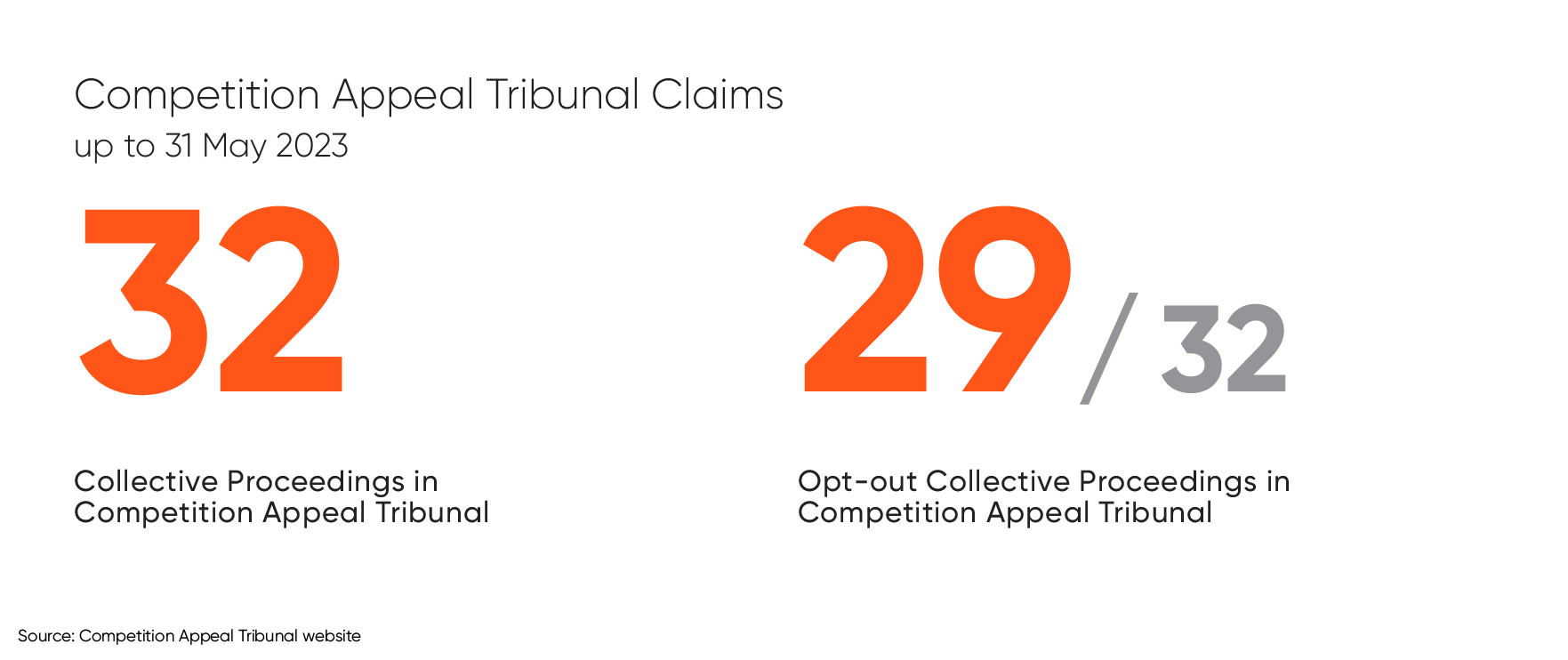The UK Consumer Rights Act
The scope for litigants in the UK to bring an opt-out collective action was vastly widened in 2015, when the UK Consumer Rights Act (CRA) introduced the ability to bring both “opt-in” and “opt-out” claims for damage flowing from competition law breaches. Even then, the CRA regime began with a stutter. The first claim issued under the CRA was withdrawn, while certification of the Walter Hugh Merricks CBE v Mastercard Incorporated and Others claim was initially refused. It obtained certification five years and eight months after it was first filed.
The introduction of this ‘US-style’ class action regime for opt-out claims – allowing an action to be brought on behalf of an entire ‘class’ who may have suffered damage – was aimed at making it easier to bring private actions against corporates for competition law infringements. While individual claimants may be dissuaded from bringing an individual competition law claim given the resources required to do so, a representative of that class of claimants supported by third-party litigation funding, could well see the advantages.
As a result, the collective proceedings regime has introduced a new paradigm for competition law enforcement in the UK.
"For major corporates, the possibility that they may face a collective claim before the CAT will now be on their risk agenda. Any company subject to competition enforcement scrutiny or holding a position of market dominance could find itself the defendant in a collective action."
Collective proceeding statistics
As at 31 May 2023, 32 collective claims had been registered before the CAT under the CRA regime. Of these, 10 have been certified to proceed to trial.
Certification is not a given for claimants. Two claims, including the first claim to be filed under the new regime, have been withdrawn, and another has had its application stayed pending a “root and branch” re-evaluation of the claim. Four related cases on credit card interchange fees were refused certification in early June 2023, and the remaining claims to be filed are at various pre-certification stages. The vast majority of claims – 29 out of the 32 – are opt-out claims. Only three were registered as opt-in claims.

Collective actions have been brought across a range of sectors and industries and in relation to different types of anti-competitive conduct. In particular, Big Tech has been targeted in the wake of investigations by the European Commission and other authorities, but claims have also extended to the banking industry, cryptocurrency and transport sectors among others. Online retailers are also targets.
Claimant lawyers have engineered novel theories of harm and abuse in order to label their claims breaches of competition law, so that they can make use of the CAT’s opt-out collective proceedings regime.
Checks and balances
While the CRA in 2015 introduced the ability for claims to be brought on an opt-out and standalone basis, it was still anticipated that the majority of cases would be follow-on. Most claims filed under the regime are standalone claims, many of which seek to draw from regulatory investigations and allege for the first time a breach of competition law.
"A collective action is potentially the biggest litigation event a defendant company could face, especially when brought on an opt-out basis, as the size of the claim can be enormous. Not all claims registered are yet quantified, but those which are range in size from just over £50 million to more than £20 billion."
To date, there have been no settlements of collective proceedings, and it remains to be seen how closely the quantum of any collective settlements reflects the staggering headline figures sought by some claimants.
The bar for registering a claim is relatively low. Under the current rules, claimants are required to show they have a plausible expert methodology that offers a reasonable prospect of establishing loss on a class-wide basis. In doing so, a claimant will need to show that it has a blueprint of the way ahead to trial.
That stress test can sometimes go in the defendant’s favour. In a February 2023 judgment, the CAT stayed an application for a CPO after finding “there is no blueprint to trial”. It gave the proposed class representative (PCR) six months to “have another go” at putting forward its case.
The certification process provides some checks and controls built into the architecture of the regime, with the CAT acting as a gatekeeper. The collective proceedings process in the CAT has a heightened degree of transparency and public attention, requiring a shift in mindset from corporates used to business-to-business litigation in the English High Court.
Not all defendants oppose certification. That said, certification challenges have been made in at least a third of the proceedings to date, often in conjunction with an application to strike out the claim or seek reverse summary judgment. Defendants have also sought to use the certification hearing to shape the CAT’s case management of proceedings, including by highlighting weaknesses in the claimant’s expert methodology that will need to be addressed before trial.
Related claims and carriage disputes
Where possible, the CAT will hear related claims together, as has been the case in the three related trains claims.
The CAT has also had to deal with a number of ‘carriage disputes’ – situations where two different class representatives are seeking to bring competing collective proceedings. They arise because there are potentially lucrative returns for funders from winning a competition class action claim, and issues that could give rise to collective proceedings may well be identified by more than one firm or funder. These present considerable case management challenges for the CAT, but it has ruled that if two similar claims are brought on an opt-out basis and both meet the authorisation condition, only one can progress.
Carriage disputes also occur in the US, but the US system has evolved to enable co-counselling. The key judgments on carriage disputes to date concerned claims brought in relation to collusion in the foreign exchange spot trading market, and in relation to the trucks cartel. In these claims, the CAT chose to determine carriage and certification issues together at a single hearing.
In contrast, in a May 2023 case management hearing on a carriage dispute in two claims, the Tribunal departed from this approach, electing to determine the issue of carriage before the certification hearing. The CAT said hearing carriage in advance of certification can save considerable costs.
An eye on the year ahead
So far, no collective proceeding claims have proceeded to full trial. The first to be heard is set to be a claim brought by class representative Justin Le Patourel, in the first quarter of 2024. All eyes are also on Walter Hugh Merricks CBE v Mastercard Incorporated and Others, which is progressing as part of the CAT’s new approach to umbrella proceedings.
Le Patourel and Merricks could come to trial next year and will test the Tribunal’s mettle when it comes to making awards against companies. Many competition claims start with huge figures and then settle for far less. How this transpires in collective proceedings, where settlements will require the approval of the CAT, and where funders get involved because of the amounts at stake, will be a key factor in the continued growth of the regime.
Following the Supreme Court’s recent judgment relating to funding arrangements in the Trucks collective proceedings litigation, all eyes are on how claimants and funders adapt their existing and future funding arrangements to avoid falling foul of the prohibition on Damages-Based Agreements in competition collective actions. This will have important implications for the trajectory of the CAT’s collective action regime.
The eventual distribution of any damages is also likely to be scrutinised carefully by the CAT, particularly given the volume of opt-out claims being brought. In contrast to other types of competition claims where settlements have the benefit of confidentiality and parties can agree to settle privately without court involvement, the collective proceeding requirement for a fairness hearing before a judge, and the high levels of transparency involved in the process, means the terms of settlements of CPO claims will be aired in a public forum as they need to be approved by the CAT.
The next 18 months will be crucial to determine how the CPO landscape before the CAT develops.

